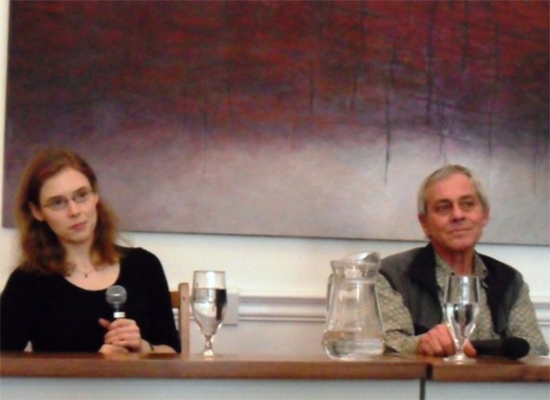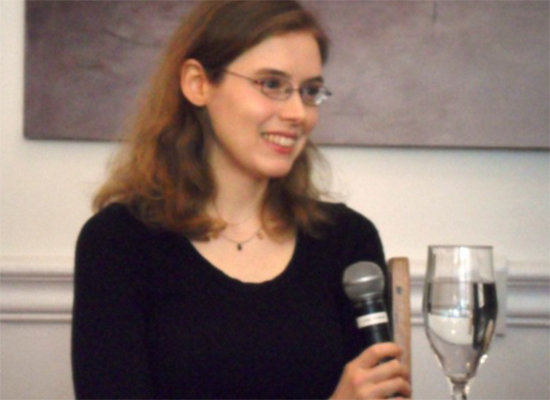EVENT: Madeline Miller – Mythology (Sunday, 25 September; Lobby Books)
MANITZA KOTZE
Madeline Miller, author of Song of Achilles, talks to François Pauw about re-imagining ancient Greek mythology.
“It was always Patroclus,” says Madeline Miller, a classic scholar and teacher of Latin and Ancient Greek, and now an acclaimed writer in her own right. As a student studying Greek mythology, Madeline was absorbed by the tale of Achilles and Patroclus, and, although Madeline was drawn to Achilles’ rage and passion, there was no decision to be made between the two characters. It was Patroclus who she found a compelling character worthy of being the protagonist: he is an observer, an outsider, he breaks the mould of the archetypical Greek hero, one who is described by a slave girl in Homer’s Iliad as a gentle soul.
Madeline is speaking to François Pauw, a classical Greek linguistic and literature researcher and lecturer. It’s a question-and-answer session, and Madeline converses easily with François, and also fields questions from the audience. Madeline explains that her interest in Greek mythology sprouted at an early age, due to her mother reading the classic tales to her at night, culminating in Song of Achilles: Madeline’s debut novel.
Patroclus may be the protagonist of Madeline’s work, but he is not the title character: Patroclus spent his life in Achilles’ shadow, a position he was happy to occupy because of his abiding love for Achilles. The novel hinges on the homosexual relationship between Achilles and Patroclus, but Madeline asserts that she did not set out to write a gay love story per se. In her estimation of the characters, it is clear, especially from the way that Achilles falls apart at Patroclus’ death and insists their ashes be buried together, that the two shared a very sensual as well as spiritual relationship.
The style and form Madeline uses was naturally influenced by the classics, and her writing resonates with ancient similes and metaphors and phraseology.
Song of Achilles reflects a growing trend of re-imagining and reinterpreting the classics and mythology. In popular fiction, television and film, mythology is ubiquitous and is simply edited and adapted to suit the storyline. Madeline believes that the increasing interest in the classics via popular films and historical novels also helps foster curiosity and awareness in young people, and often when teaching Madeline asks students to compare and identify changes made to original myths in popular works. As for the modifications in her own work, she strove to keep them to the absolute minimum, and omitted everything from the Iliad that Patroclus did not witness or experience himself.
François mentions three secondary characters that were of particular importance, who Madeline tells us about. The centaur Chiron, who taught both Achilles and Patroclus, is a civilised and intelligent character, not at all prone to the excesses of other centaurs. He is wise and humble, but also an outsider who has dedicated his life to the teaching of the arts and civilisation, but must suffer the enduring grief of outliving his students.
Madeline changed the character of Briseis, as she did not want her to be a princess but someone who could speak for the ordinary people who are drawn into a war they have no stake in, a theme certainly as relevant today as it has always been. Briseis’ friendship with Patroclus is central to developing his character. She is also the only character who realises that the prophecy that the best of Achilles’ men will die before him pertains to Patroclus. Thetis, Achilles’ mother, is negatively portrayed, as is apparent from the extract that François reads from Song of Achilles. She is petulant, vindictive and, as a goddess, has little sympathy for human suffering. However, although it is only mentioned briefly at the end of the book, Madeline explains Thetis’ backstory and the tragedy that turned her into this cruel and terrifying creature, proving that she knows her characters well enough to justify their actions even off page.
Madeline agrees that readers whose worldview does not include the divine could be alienated by the attention she gives to the gods, but she validates her decision by pointing out that, in the context of the story, the gods and the mystical were very much a part of everyday reality. She says she believes the popular fascination with the supernatural and superhuman characters can be seen as a symbol of human beings reaching for something that is beyond human, seeking someone who has all the answers. Her characters, however, differ from the close-to-perfect characters found in other popular supernatural fiction, in that even they, the immortals and the gods, are flawed.
Madeline describes Song of Achilles as first and foremost a story, rather than a message she is trying to convey. She remained true to the love between Achilles and Patroclus as it was before homosexuality in the classics was “sanitised” and covered up. However, she admits that implicit statements on current issues are always present and that, because stories speak to the human condition, they can be used as a springboard to speak about current matters. Her intention, however, is not to address social issues and communicate specific beliefs and ideas to her audience, but rather, in the tradition of Homer and Virgil, to tell an excellent story. I am convinced that she has done them proud.
Oh, and remember to read to your children: Madeline’s mother did, and look at her now!

CENTRE STAGE: Madeline Miller and François Pauw.

François Pauw

Madeline Miller listens to a question from the audience.
 SLiPStellenbosch Literary Project
SLiPStellenbosch Literary Project